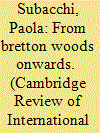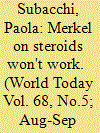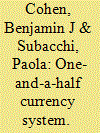| Srl | Item |
| 1 |
ID:
083058


|
|
|
|
|
| Publication |
2008.
|
| Summary/Abstract |
Will the dollar soon lose its key international currency status? In this article I argue that neither the emergence of the Euro nor geopolitical issues threaten the future of the dollar. The world's central banks may slow down their accumulation of dollars, but are unlikely to put an end to the dollar standard regime. I also caution against confusing the international role of the dollar as the supreme store of value with its two other roles-as the dominant international unit of account and medium of exchange. These latter two functions do not change abruptly, meaning, once again, that there is no immediate threat to the future of the dollar. The article also discusses similarities between today's dollar standard and the Bretton Woods regime, and conclude that the complexity of today's system is such that it cannot just be defined as a repetition of the Bretton Woods system, or 'Bretton Woods 2'.
|
|
|
|
|
|
|
|
|
|
|
|
|
|
|
|
| 2 |
ID:
135414


|
|
|
|
|
| Summary/Abstract |
Confidence in the state’s willingness and ability to use future taxation to meet all of its obligations. In ... lack of small change. Those were the years when coins were used to operate all sorts of devices, from ... people. It changes hands quicker than electronic money; it is the easiest and cheapest, and often the.
|
|
|
|
|
|
|
|
|
|
|
|
|
|
|
|
| 3 |
ID:
126221


|
|
|
|
|
| Publication |
2012.
|
| Summary/Abstract |
Paola subacchi considers Europe's way out of its current crisis
|
|
|
|
|
|
|
|
|
|
|
|
|
|
|
|
| 4 |
ID:
081743


|
|
|
|
|
| Publication |
2008.
|
| Summary/Abstract |
Global integration through trade and finance is the defining feature of today's international economic order. As mature industrial economies and emerging market economies become more integrated and interdependent, countries that play a key role in the global supply chain increasingly shape the world economy and influence its dynamics. How is the world economy changing? This article argues that a multipolar structure is an accurate description of the pattern in which the world economy is organized and power is distributed among players. Power is now more diffused, but not equally distributed; new players have increased their capacity for action, but not necessarily their influence. The balance remains tilted in favour of the old poles, with the United States in the strongest, albeit less dominant, position. In particular, there is a misalignment between the new poles' role in the global economy and their ability, and willingness, to influence institutions and participate in rule-setting. This is where the major source of potential tension and conflict lies in today's economic order. The combination of global financial markets and national politics has created a lopsided system where political arrangements are still based on the sovereignty of states and where the development of international institutions that could promote collective goods has not kept pace with the development of markets. Looming changes and fear of systemic collapse, especially in view of the current economic turmoil that has the potential to weaken global growth and impose huge strains on the international order, may spur action. However, whether this will trigger renewed efforts to rethink existing arrangements, improve global governance and strengthen the rules-based framework that underpins the global order remains an open question.
|
|
|
|
|
|
|
|
|
|
|
|
|
|
|
|
| 5 |
ID:
085704


|
|
|
| 6 |
ID:
066035


|
|
|
| 7 |
ID:
096248


|
|
|
|
|
| Publication |
2010.
|
| Summary/Abstract |
Although the financial and economic crisis did not directly hit the international monetary system, it has lead to the rethinking of the overall architecture that underpins the world economy. Can the current system of floating currency blocs with dollar-based trade and reserves withstand the strains of the global adjustment ahead? It is time to consider alternatives. This article argues that the existing system needs to evolve into a multicurrency one in which a number of international currencies, ideally representing the main trading areas, have the function of storing value and providing the unit of measure. A multicurrency system would respond more flexibly to the demand for liquidity and would provide a way to diversify the accumulation of reserve assets. It is also more appropriate for the increasingly multipolar world economy.
The article discusses how in today's larger and more integrated world economy the dependence on the dollar as the basis of both trade flows and financial reserves has become excessive, creating some fundamental imbalances. However, while the rationale for change is clear, the current system is locked in a form of stable disequilibrium where the status quo carries the lowest risk for most players in the short-term. Any abrupt move away from the dollar could trigger trade flow disruption and exchange value losses. Policy cooperation should keep the imbalances under control and manage the transition to a more stable system. The system will evolve, albeit gradually. Looking at the steps taken by some countries, notably China, there is the gathering impression that this decade is one of transition, rather than a 'Bretton Woods moment'. Any reshaping will have to bring in the views of the 'rising powers', China in particular, and their concerns about the limitations of the existing system and the increasingly asymmetric burden of adjustment that it imposes.
|
|
|
|
|
|
|
|
|
|
|
|
|
|
|
|